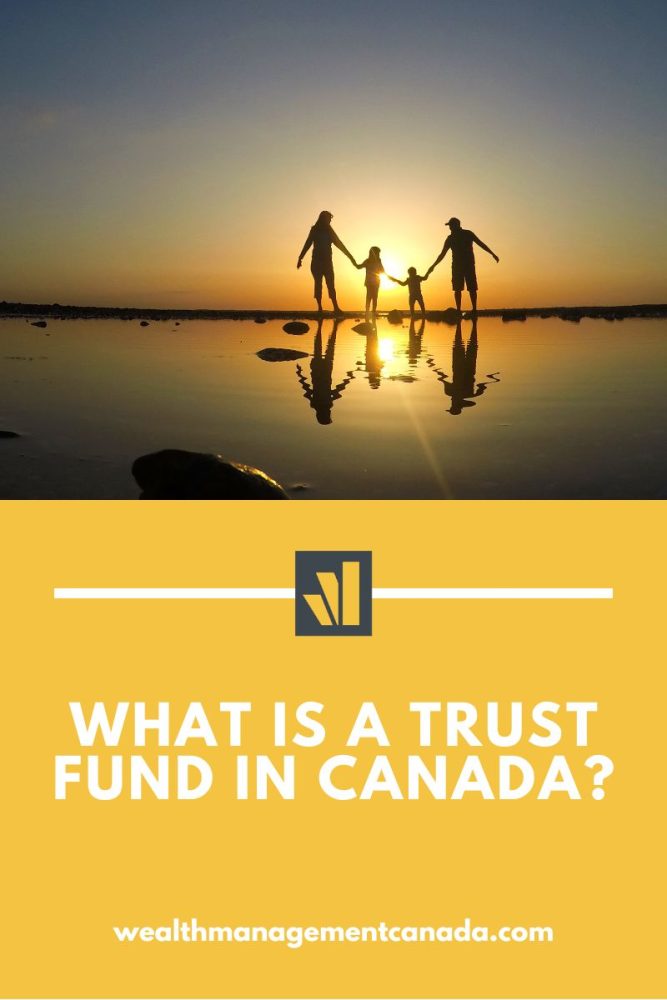Trust funds have been sensationalized as something for the ultra rich. While they are used by the wealthy for various financial benefits, they can actually be used by anyone who wants to safeguard assets and make plans for passing on wealth to their family and friends. So what is a trust fund in Canada and how does it work? We’ll explore the ins and outs of Canadian trust funds in this article, including taxation, formation, and the pros and cons. Continue reading to learn more!

Table of contents
What is a trust fund in Canada?
A trust fund is a financial vehicle that holds assets for a beneficiary to inherit at a future date. The assets held in the trust could be money, real estate, stocks, and business ownership shares. A trust can hold virtually any kind of investment or personal property. Although, people don’t tend to use trusts to hold assets like vehicles, low value or sentimental property, or chequing and savings accounts.
Often, trust funds are associated with the ultra wealthy. You have probably seen some type of schtick in a movie or TV show where the rich kid gets access to a ton of cash from their family’s trust fund when they turn 18. In fact, it’s become somewhat of a cliché! It is true that the wealthy use trusts to build and maintain wealth, however, that’s just because they tend to have more assets at their disposal. In reality, the middle class use trusts frequently too. Moreover, anyone who has an asset they want to safeguard until it can be passed on to a beneficiary can benefit from using a trust.

START WORKING WITH A WEALTH MANAGER NOW
Do trust funds exist in Canada?
Yes, trust funds exist in Canada. The purpose of a trust is often to help individuals pass on generational wealth and conduct estate planning. Like a corporation, a trust is a separate legal entity. This is important to note because it requires annual tax filings and certain legal considerations.
Related Reading: The 4% Withdrawal Rule Demystified
Types of Trust Funds in Canada
In Canada, there are two types of trust funds: testamentary and inter-vivos. Let’s take a moment to explore the definition of these two types of trusts:
- Testamentary trust. This type of trust is usually created upon the death of a person. It is either formed through a will or by a court order. The idea is to preserve the estate in a trust while it is determined how the deceased person’s assets will be taxed and distributed. Generally speaking, a testamentary trust is not actively created, but rather it is a result of the death of a person with an estate.
- Inter-vivos trust. An inter-vivos trust is any type of trust that isn’t a testamentary trust. These can be formed by a living individual or family. They can be manipulated to achieve certain financial outcomes. There are a ton of different types of inter-vivos trusts, such as alter ego trusts, real estate investment trusts (REITs), employee trusts and more.
How does a trust fund work in Canada?
As mentioned, trusts hold assets that are intended to be given to a beneficiary at a certain point in time. In order to execute this, there are three critical parties involved with a trust’s management. Here’s a breakdown of each role and how they contribute to a trust’s functioning:
- Grantor. This is the person who creates the trust and is the original owner of whatever assets are put into the trust. The grantor also appoints the trustee and communicates executive decisions of the trust to them. Sometimes grantors are referred to as a settlor.
- Trustee. This is a person or entity that is appointed by the grantor. Their responsibility is to manage the trust in accordance with the grantor’s wishes. In some cases, the grantor and trustee are the same person.
- Beneficiary. This is the person or entity who will eventually inherit the assets held in the trust.
To summarize, a grantor creates the trust, the trustee manages the trust, and the beneficiary benefits from the trust. Outside of this, the trustee must ensure the annual trust returns are filed and the assets within the trust are maintained for the beneficiary’s benefit.

START WORKING WITH A WEALTH MANAGER NOW
Are trust funds taxable in Canada?
Yes, trust funds are a taxable entity in Canada, the same way an individual or corporation is. The trustee is responsible for filing T3 tax returns. Similar to other tax returns, the income and expenses of the trust must be reported and tax is paid on any profit. A trust pays tax at the highest marginal tax rate in Canada. Usually, tax only arises if there is an addition to the trust or the trust distributed funds to a beneficiary.
If a trust earns income and distributes it to beneficiaries, the distribution is considered a deduction. This results in a net income of $0 and the trust would not owe any tax. Instead, the beneficiary would report the income received from their trust on their personal or corporate tax return and pay tax on it. If the beneficiary has a lower tax rate than the highest bracket, there is motivation for the trust to distribute any income earned.
The 21-Year Rule
In Canada, there is a special rule for trusts called the 21-year rule. This rule states that all assets held within a trust are “deemed” as sold every 21 years. When there is a deemed disposition, capital gains tax applies and a tax liability arises. In other words, the trust’s assets are considered to be sold and tax on the assumed profit or loss applies.
Keep in mind a “deemed disposition” doesn’t actually require you to sell the assets in the trust. Rather, it’s just “deemed” to ensure capital gains taxes don’t become unreasonable for the beneficiary. Plus, the Canada Revenue Agency always wants their share in tax!
Related Reading: General Tax Avoidance Rule
How to set up a trust fund in Canada
Before setting up a trust fund in Canada, ask yourself the following questions:
- Am I prepared to manage the additional paperwork and administration of a trust?
- What are my objectives and goals with respect to a trust?
- Who will the trustees and beneficiaries be?
- What property do I want to put into the trust?
- Do I need a wealth manager to assist with the process?
Once you’ve figured out the blueprint of your trust, you can begin the process of creating it. Here’s the steps to follow:
- Step 1: Create a Trust Document. A trust document is a legal contract that outlines the objective of the trust and what assets will be held within it. Be sure that communication within the trust document is clear so there isn’t room for misinterpretation. A lawyer’s assistance may be required to establish the trust document.
- Step 2: Inform the Trustee of their Duties. Appoint the trustee and make them aware of their responsibilities for the trust.
- Step 3: Sign the Trust Document. The trust document should be signed by you (the grantor) and the trustee. It’s wise to have a witness as well. This step involves the formal creation of the trust as a legal entity. You will likely need to file some paperwork with the Canada Revenue Agency to achieve this and obtain a trust account number.
- Step 4: Transfer Property into the Trust. Once the trust is officially created, you can transfer the property outlined in the trust document into the trust.
- Step 5: Maintain the Trust. Now that everything is set up, it’s all about maintaining the trust until it passes on assets to the beneficiaries. As the grantor, be sure to check in with the trustee from time to time to assess the trust’s position.
How much does it cost to set up a trust in Canada?
The cost to set up a trust depends on who you consult and how much you do on your own. However, a good estimate of what you can expect to pay is $1,500.
Advantages and Disadvantages of Trusts
Trusts come with a lot of benefits, but there are some downsides to consider too. Below is a breakdown of the pros and cons of trusts in Canada.
| Advantages | Disadvantages |
| Reduces the tax burden for the grantor; any income is normally taxed in the hands of the beneficiary, which results in overall lower tax | The 21-year rule which deems that all trusts dispose of their assets 21 years after inception, resulting in a tax liability |
| Enables you to plan and prepare for the transfer of your wealth to family and friends | Greater administration and recordkeeping is required, you may need to hire a professional to assist |
| Protects your assets from creditors, lawsuits, bankruptcy, and other negative financial circumstances | Additional annual tax return filings (T3) for your trust(s) |
Related Reading: Wealth Management Importance: The relationship with your wealth manager
Is it better to have a will or a trust in Canada?
A will is a legal document that communicates how you would like your assets, property and estate distributed upon death. It can also communicate who will manage the estate until distribution. In many ways, a will and a trust are similar, so which is better?
Ultimately, a will or a trust is not better than the other. Rather, each tool has its own benefits and drawbacks. Some may get more benefit out of a will whereas others may find more use with a trust. In addition, a will and a trust are not mutually exclusive. You can use both in conjunction to achieve your financial goals.
Generally speaking, a will can be more easily challenged in a court of law as opposed to a trust. In addition, trusts avoid the probate process which can reduce tax burdens and the time for people to receive their inheritance. If these are things that are concerning to you, the use of a trust can provide advantages over a will. However, it is still recommended you have a will for assets held by you personally.
But on the other hand, trusts require more administration than a will. This means trusts are more expensive to maintain. Some may prefer to keep things simple and not be concerned with what happens after they die thereby preferring a will.
At the end of the day, it all depends on your financial objectives and goals! Be sure to consider those when deciding whether a trust, will or both is ideal for your estate plans.
Do you need help creating or maintaining a trust? A wealth manager can help. Complete this quick questionnaire to find your ideal match today!